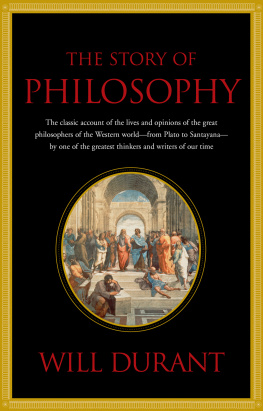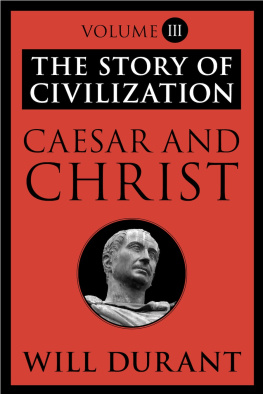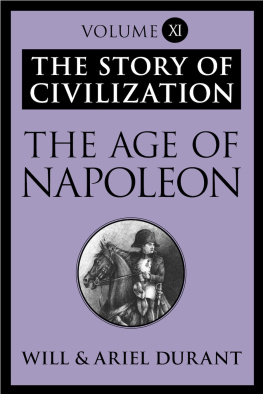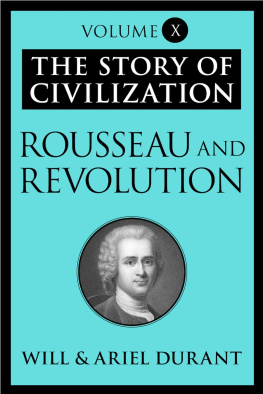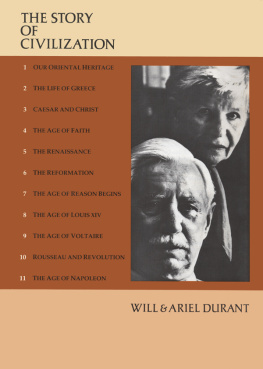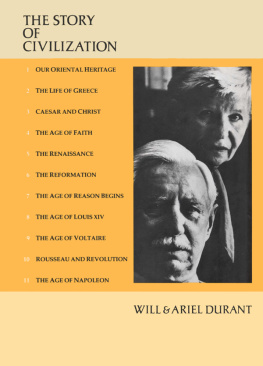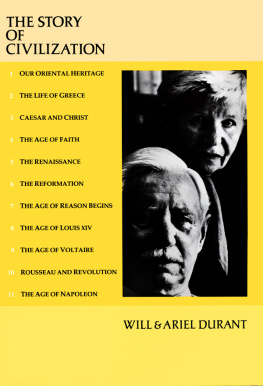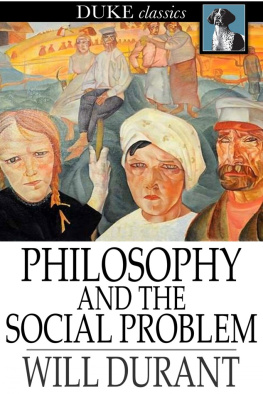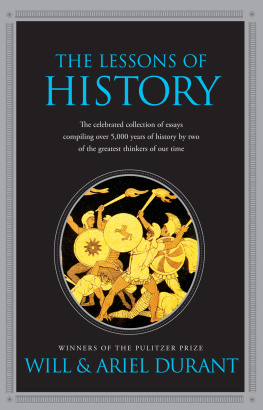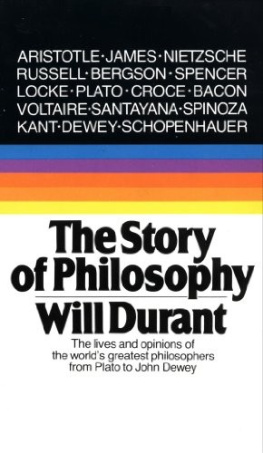Diogenes Laertius: Lives of the Philosophers. Loeb Classical Library. (Putnam.) 2 volumes. $2.50 each.
Xenophon: Memorabilia. Loeb Classical Library. (Putnam.) $2.50.
Plato: Works of, edited by Prof. Irwin Edman. (Simon & Schuster.) $2.50.
Plato: Republic. Translated by Jowett. (Oxford.) 2 volumes. $2.85.
Plato: Republic. Translated by H. Spens. Everymans Library. (Dutton.) $.80.
Plato: Dialogues. Everymans Library. (Dutton.) $.80.
Plato: Four Socratic Dialogues. Translated by Jowett. (Oxford.) $1.70.
Aristotle: Ethics. Translated by D. P. Chase. Everymans Library. (Dutton.) $.80.
Aristotle: Ethics. Translated by Bishop Welldon. (Macmillan.) $2.75.
Aristotle: Politics. Translated by Jowett. (Oxford.) $1.70.
Aristotle: Politics. Translated by William Ellis. Everymans Library. (Dutton.) $.80.
Lucretius: On the Nature of Things. Translated by W. E. Leonard. Everymans Library. (Dutton.) $.80.
Lucretius: On the Nature of Things. Translated by C. Bailey. (Oxford.) $1.70.
Epictetus: Book of Epictetus containing Enchiridion. (Dodge.) $1.50.
Marcus Aurelius: Meditations. Translated by Casaubon. Everymans Library. (Dutton.) $.80.
Marcus Aurelius: Meditations. Translated by John Jackson. (Oxford.) $1.70.
Bacon, Francis: Novum Organum. (Oxford.) $5.00.
Bacon, Francis: Advancement of Learning. Everymans Library. (Dutton.) $.80.
Descartes, Ren6: Discourse on Method. (Open Court.) $1.00.
Hobbes, Thomas: Leviathan. Everymans Library. (Dutton.) $.80.
Locke, John: Essay on the Human Understanding. (Dutton.) $2.50.
Spinoza, Benedictus: Ethics. Everymans Library. (Dutton.) $.80.
Leibnitz, G. W.: Essays Concerning Human Understanding. (Open Court.) $3.00.
Voltaire, Francois M.: Prose Works. (Black.) $3.00.
Holbach, Paul H.: System of Nature. No edition now in print.
Hume, David: Enquiry Concerning the Principles of Human Morals. (Open Court.) $1.00.
Hume, David: Enquiry Concerning Human Understanding. (Open Court.) $1.00.
Hume, David: Treatise of Human Nature. Everymans Library. 2 volumes. (Dutton.) $.80 each.
Kant, Immanuel: Critique of Pure Reason. (Macmillan.) $5.00.
Kant, Immanuel: Critique of Aesthetic Judgment. (Oxford.) $4.20.
Kant, Immanuel: Selections from Kants Philosophy by John Watson. (Macmillan.) $2.50.
Hegel, G. M. F.: Philosophy of History. No edition now in print.
Schopenhauer, Arthur: The World as Will and Idea. (Scribners.) 3 volumes. $19-50.
Schopenhauer, Arthur: Works of, edited by Will Durant. (Simon & Schuster.) $2.50.
Schopenhauer, Arthur: Essays. (Willy Book.) $3.00.
Comte, Auguste: Positive Philosophy. (George Bell.) 3 volumes. Volume 1 is now out of print. $2.40 each.
Mill, J. S.: System of Logic. (Longmans, Green.) $2.50.
Spencer, Herbert: First Principles. (Appleton.) $3.00.
Nietzsche, Friedrich: The Will to Power. (Macmillan.) 2 volumes. $3.50 each.
Nietzsche, Friedrich: Thus Spake Zarathustra. (Macmillan.) $4.00 (Modern Library.) $.95.
Bradley, F. H.: Appearance and Reality. (Macmillan.) $6.50.
Bergson, Henri: Creative Evolution. (Holt.) $3.50.
Croce, Benedetto: History. (Harcourt, Brace.) $4.50.
Russell, B. A.: Mysticism and Logic. (Longmans, Green.) $3.00.
Russell, B. A.: Selected Papers. (Modern Library.) $.95.
James, William: Pragmatism. (Longmans, Green.) $2.00.
Dewey, John: Human Nature and Conduct. (Holt.) $2.25.
Dewey, John: Reconstruction in Philosophy. (Holt.) $2.00.
Santayana, George: Life of Reason. (Scribners.) 5 volumes. $2.00 each.
WILL DURANT (18851981) was awarded the Pulitzer Prize(1968)and the Medal of Freedom (1977). He spent over fifty years writing his critically acclaimed eleven-volume series, The Story of Civilization (the later volumes written in conjunction with his wife, Ariel). His book The Story of Philosophy (1926) has introduced more people to the subject of philosophy than any other. Throughout his long life, Durant was passionate in his quest to bring philosophy out of the ivory towers of academia and into the lives of laypeople. A champion of human rights issues such as the brotherhood of man and social reform long before such issues were popular, Durant, through his writings, continues to entertain and educate readers the world over, inspiring millions of people to lead lives of great perspective, understanding, and forgiveness.

Cover painting Alinari Archives/CORBIS
Register online at www.SimonandSchuster.com for more information on this and other great books.

BY WILL DURANT
THE STORY OF PHILOSOPHY
TRANSITION
THE PLEASURES OF PHILOSOPHY
ADVENTURES IN GENIUS
THE STORY OF CIVILIZATION:
I. Our Oriental Heritage
II. The Life of Greece
III. Caesar and Christ
IV. The Age of Faith
V. The Renaissance
VI. The Reformation
BY WILL AND ARIEL DURANT
VII. The Age of Reason Begins
VIII. The Age of Louis XIV
IX. The Age of Voltaire
X. Rousseau and Revolution
XI. The Age of Napoleon
Thank you for purchasing this Simon & Schuster eBook.
Sign up for our newsletter and receive special offers, access to bonus content, and info on the latest new releases and other great eBooks from Simon & Schuster.

or visit us online to sign up at
eBookNews.SimonandSchuster.com
TO MY WIFE
Grow strong, my comrade... that you may stand
Unshaken when I fall; that I may know
The shattered fragments of my song will come
At last to finer melody in you;
That I may tell my heart that you begin
Where passing I leave off, and fathom more.

SIMON & SCHUSTER PAPERBACKS
ROCKEFELLER CENTER
1230 AVENUE OF THE AMERICAS
NEW YORK, NY 10020
www.SimonandSchuster.com
COPYRIGHT 1926, 1927, 1933, RENEWED 1954, 1955, 1961
BY WILL DURANT
ALL RIGHTS RESERVED
INCLUDING THE RIGHT OF REPRODUCTION
IN WHOLE OR IN PART IN ANY FORM
FIRST SIMON & SCHUSTER PAPERBACK EDITION 2005
SIMON & SCHUSTER PAPERBACKS AND COLOPHON
ARE REGISTERED TRADEMARKS OF SIMON & SCHUSTER, INC.
ISBN-13: 978-0-671-69500-2
ISBN-10: 0-671-69500-2
ISBN-13: 978-0-671-20159-3 (PBK)
ISBN-10: 0-671-20159-X (PBK)
ISBN-13: 978-1-47670-260-5 (eBook)
Apologia Pro Libro Suo
I
My publishers have asked me to use the occasion given by a new edition of The Story of Philosophy to discuss the general question of outlines, and to consider some of the shortcomings of the volume. I am glad of this opportunity to acknowledge these, and to express with all the weakness of mere words the gratitude that I must always feel for the generosity with which, despite so many defects, the American public has received this book.
The outlines came because a million voices called for them. Human knowledge had become unmanageably vast; every science had begotten a dozen more, each subtler than the rest; the telescope revealed stars and systems beyond the mind of man to number or to name; geology spoke in terms of millions of years, where men before had thought in terms of thousands; physics found a universe in the atom, and biology found a microcosm in the cell; physiology discovered inexhaustible mystery in every organ, and psychology in every dream; anthropology reconstructed the unsuspected antiquity of man, archeology unearthed buried cities and forgotten states, history proved all history false, and painted a canvas which only a Spengler or an Eduard Meyer could vision as a whole; theology crumbled, and political theory cracked; invention complicated life and war, and economic creeds overturned governments and inflamed the world; philosophy itself, which had once summoned all sciences to its aid in making a coherent image of the world and an alluring picture of the good, found its task of coordination too stupendous for its courage, ran away from all these battlefronts of truth, and hid itself in recondite and narrow lanes, timidly secure from the issues and responsibilities of life. Human knowledge had become too great for the human mind.

